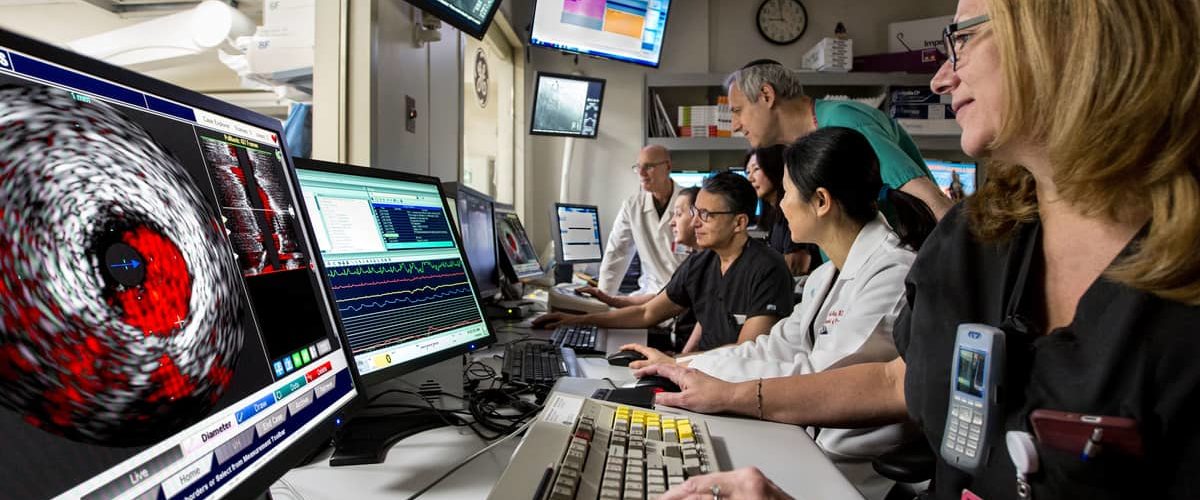Specialized services for ischemic heart disease
We know an ischemic heart disease diagnosis can be devastating, and we’re here to help provide you with treatment options that fit your physical, mental, and emotional needs. We offer specialized services, including smoking cessation and nutrition counseling to help our patients firsthand reduce their risk of a heart attack. Our physicians, nurses, cardiologists, and surgeons work together to provide patient-tailored care using sophisticated technology and patient-focused treatments.
What is ischemic heart disease?
Ischemic heart disease, also known as coronary artery disease (CAD) or coronary heart disease, is best described as decreased blood flow from clogged coronary arteries to the heart muscle, which often leads to a heart attack.
Risk factors for ischemic heart disease include:
- Diabetes
- High blood pressure
- High cholesterol
- Obesity
- Smoking
Conditions we treat
Coronary artery disease
The coronary arteries supply blood and oxygen to the heart muscle. When blockages from plaque or inflammation in the coronary arteries restrict the blood supply to the heart muscle (a condition known as ischemic heart disease), this puts extra strain on the heart.
This additional stress can lead to:
- Acute coronary syndrome – A medical term that broadly refers to situations where the blood supply to the heart is suddenly blocked
- Acute myocardial infarction – A heart attack
- Heart failure – A chronic, progressive condition in which the heart is unable to pump enough blood to meet the body’s needs
Narrowing of the arteries in the heart is called coronary atherosclerosis. Arteries may be narrowed in other parts of the body as well. Blockages that occur in the arms, legs, or elsewhere indicate a condition called peripheral artery disease or peripheral vascular disease; both conditions are types of atherosclerotic cardiovascular disease.
Removing these blockages can improve overall heart function, which may improve or resolve CAD symptoms. Controlling risk factors such as smoking, high blood pressure, high cholesterol, and diabetes can help prevent the buildup of plaque or inflammation in the coronary arteries.
Coronary artery disease treatments
Removing blockages in the arteries can improve overall heart function, which may improve or resolve CAD symptoms. Controlling risk factors such as smoking, high blood pressure, high cholesterol, and diabetes can help prevent the buildup of plaque or inflammation in the coronary arteries.
There are two types of treatment:
- Coronary artery bypass graft (CABG) – CABG is one type of congestive heart failure procedure to reroute the blood supply around a blocked section of the artery. This procedure is performed in the operating room by a cardiothoracic surgeon. During this procedure, the cardiac surgeon removes healthy blood vessels from another part of the body, such as a leg or the chest wall. They then surgically attach the vessels to the diseased artery in such a way that the blood can flow around the blocked section.
- Percutaneous coronary intervention (PCI) – PCI is one type of coronary artery disease treatment to reopen blocked vessels. This procedure is performed in the cardiac catheterization lab. A catheter with a tiny deflated balloon on the end is inserted through an incision in the femoral or radial artery and advanced through to the diseased artery. The balloon is then inflated to push open the artery. A stent is then placed to keep the blood vessel open.
The dedicated team at our coronary heart disease center in Brooklyn, NY, is committed to providing our patients with the information and tools they need to make informed decisions about their health care. Our goal is providing outstanding care for better patient outcomes.
Listen to Anthony’s story
Here for you before and after treatment
If you’re experiencing arrhythmia symptoms, you probably have questions. What is an arrhythmia and what does it mean for your health? What are the causes and what treatments are available? Is an arrhythmia the same as heart disease?
Our heart specialists are here for you. We will answer all your questions and teach you everything we know about improving symptoms of arrhythmia.
Call 718-HRT-BEAT (718-478-2328) to make an appointment with an ischemic heart specialist

















